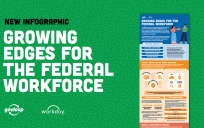 Let’s take a step back and remember how the federal government interacted with its constituents 12 months ago. In some cases, you’d go in person into an office or call a phone number. If in person, you’d manually fill out some forms, wait in line and eventually hand the papers and your documentation over to someone behind a desk who’d manually input the information into some application. If you picked up the phone, you’d wait on hold until an operator could speak with you. They’d listen, take some notes and type away in the same application. The mail was a third option, requiring you to print out forms, compile documentation, make copies and head on down to wait in line at the post office.
Let’s take a step back and remember how the federal government interacted with its constituents 12 months ago. In some cases, you’d go in person into an office or call a phone number. If in person, you’d manually fill out some forms, wait in line and eventually hand the papers and your documentation over to someone behind a desk who’d manually input the information into some application. If you picked up the phone, you’d wait on hold until an operator could speak with you. They’d listen, take some notes and type away in the same application. The mail was a third option, requiring you to print out forms, compile documentation, make copies and head on down to wait in line at the post office.
However you interacted with the government, maybe you’d get a status update or timeframe for a response. More likely, you’d hang up or head back home and hope that everything behind the curtain was progressing like it should.
Fast-forward to today. Things are completely different. Citizen experience is digital, it’s seamless, and it’s personalized. Engaging with federal agencies now feels more like an Amazon transaction than visiting the dentist. The government used to dictate experience to constituents. Today, constituents have a choice how they apply and receive services.
We’re Not Going Back – So Adapt
Citizens’ expectations are that they can interact with federal agencies seamlessly and frictionlessly through digital channels. Their needs, preferences and status carry over between touchpoints — ensuring prior engagements inform today’s interactions. Digital transformation was inevitable, but COVID-19 and the resulting shutdowns accelerated massive changes in how the government works. As millions receive the long-awaited vaccine and life starts to return to normal, giving citizens’ powerful experiences is going to continue to grow in importance to agencies’ core mission.
Here are three things I learned in an unprecedented year:
- There’s no point in predicting the future: 12 months ago, no one could have predicted how this past year has turned out. No one. Government agencies now recognize more than ever that anything can happen, and there’s no way we can prepare for every scenario. We watched things break, and we watched things stretch to their breaking point. Priorities changed. Things like resiliency, high availability and business continuity are now more critical than ever, and IT departments need to embrace solutions that enable flexibility, agility and scalability that allow decisions to be made quickly and in real time. At the same time, applications need to be modified to fit changing expectations and conditions at a moment’s notice.
- Work from anywhere matters: That a majority of government employees are working from home would have seemed impossible just a year ago — but now it’s a critical capability for keeping the government up and running. Federal agencies now need tools to balance workloads across a distributed workforce and ensure that users have fast, reliable and secure access to the applications they used exclusively in the office inside the network perimeter. There’s no doubt that remote work will continue, and agencies need intelligent solutions to manage these new challenges. It used to be that a supervisor could stop by, look over a civil servant’s shoulder and provide guidance. Artificial intelligence needs to take up that role — ensuring employees have the information and direction they need to make the right decisions wherever they work.
- Digital transformation will continue: We’re not returning to the pre-pandemic volume of in-person services. Constituent services and experience over multiple digital channels and in-person will need to be managed through modern case management solutions. The old ways of doing things probably won’t transition online in the same way. Agencies are going to have to be flexible as they figure out how to engage with technically savvy constituents whose expectations are soaring.
The past year has shown us that the way government works can change. Citizens can and should demand consumer-like experiences from civil servants where they call the shots over when, where and how they interact with federal agencies. Digital transformation will continue to accelerate — and we’ll all be much better off because of it.
You may also be interested in “GOVERNMENT TRANSFORMATION DEMANDS A MODERN DATA EXPERIENCE” and “HOW MODERN AGENCIES OUTGROW THEIR DATA BACKUP STRATEGIES.”
Interested in becoming a Featured Contributor? Email topics you’re interested in covering for GovLoop to [email protected]. And to read more from our Winter 2021 Cohort, here is a full list of every Featured Contributor during this cohort.
Jason Adolf is a public sector expert for Appian, an enterprise low-code development platform.





These are great takeaways!